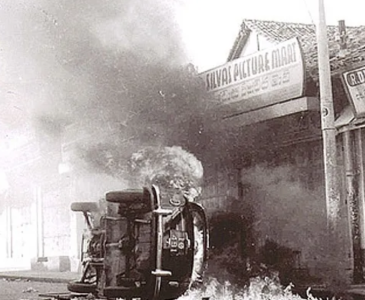By Archana Ravichandradeva and Ambihai Akilan.
It is not often that politicians say the quiet part out loud, yet the brazenness of Jayawardene’s speech foreshadowed the trajectory of the bloody history of Sri Lanka over the next 40 years and it set the foundation for the failure of a state that was once known as the Pearl of Asia.
Soon after Black July, Sri Lanka descended into a brutal 30-year armed conflict that ended in allegations of genocide, war crimes, and crimes against humanity with the Mullivaikkal massacre of 2009. The country continues to be wracked by crises, leading to almost total economic and political collapse in 2022. The roots of the current collapse should be traced back to Black July.
Black July, which occurred in Sri Lanka in July 1983, was a series of state-sponsored pogroms against the country’s Tamil community by the majoritarian Sinhalese community and the government, leading to widespread violence, death, and destruction. The pogroms were the manifestation of deep-seated ethnic tensions and entrenched ethno-majoritarianism of the state, which upheld Sinhala-Buddhist hegemony above all else.
This period marked the beginning of the great Tamil displacement, as individuals were forced to abandon their homes and businesses in urban centers, seeking refuge either within the Tamil-dominated northeast region or in countries such as the United States, Canada, and the United Kingdom. Millions of Tamils have fled the island, and over the years, the Tamil community has struggled and grown to flourish in displacement and exile.
Meanwhile, Sri Lanka, remains stuck in an ethno-majoritarian time loop. Fifteen years after the end of the armed conflict in Sri Lanka, the scars of Black July continue to resonate, hindering progress and development. The northeast of the island continues to be the most economically deprived, amid a heavy presence of the Sinhalese-dominated military, which has been accused of illegally occupying large swathes of Tamil land, and the repression of civil, political, and religious rights of Tamils.
Within the country’s borders, ethno-majoritarian policies and prejudiced practices weave a tapestry of fear and exclusion, shrouding the prospect of a thriving society while casting a shadow upon investment and growth. The lack of accountability and justice for past atrocities sends a chilling message that human rights violations can go unpunished, further undermining the nation’s credibility in the global arena. As long as the root causes of Black July and the subsequent conflict are not fully addressed, Sri Lanka’s development will continue to be impeded by the ghosts of its troubled past.
The legacy of Black July continues to reverberate in contemporary Sri Lanka, leaving a profound impact on the nation’s social fabric and political landscape. Acknowledging and addressing the historical injustices of Black July, acknowledging the specific impact it has had on the Tamil community, and addressing root Tamil grievances is crucial for the country to engage in its own reckoning, and for the first time in its history, chart new futures.
